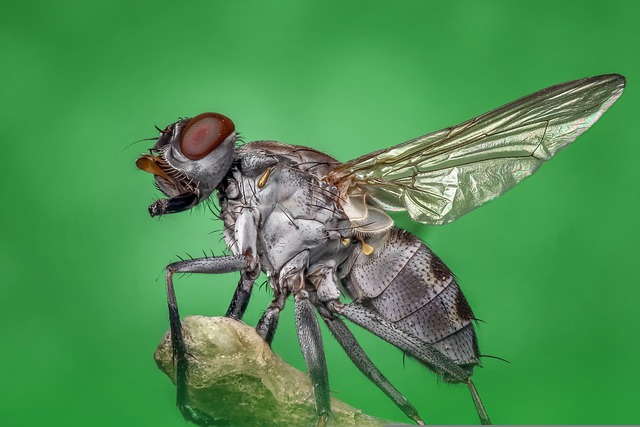Orangeries are likely to be opened in anticipation of the arrival of sunny conditions because the weather has undoubtedly begun to improve.
Orangery extensions are regarded as the ideal home for flies even though this would seem to be more than enough to feel optimistic. This presents a frustrating problem for many.
So, how to get rid of flies in an orangery?
To get rid of flies in an orangery: Make the area outside your orange orchard equally appealing as a place to start. This effectively amounts to creating a barrier to draw in and hold the fly because the fly will catch it this way before it attempts to enter your home.
We have looked at what draws these pests to orangeries and the kinds of things you can do to reduce their intrusion over the coming months in order to better prepare you for the rise in their numbers.
For more information, continue reading.
Table of Contents
Attractive Things For Flies To An Orangery
Many people install orangeries because of the warmth, vibrancy, and shelter they offer, but sadly, flies also find these to be attractive. They can find shelter inside an orangery from the elements and other dangers from the outside.
The use of orangeries for dining and food preparation also makes it likely that there will be leftovers, the likes of which also tempt flies to visit. Flies also prefer brightly lit areas, so the fact that orangeries frequently have both roof lanterns and electrical lighting means you’ve created the kind of environment that flies really enjoy.
What Can Be Done To Stop Flies From Arriving?
Making an environment that is equally appealing outside of your orangery would be a great place to start. In this way, flies will latch onto this before even considering entering your home, so in a sense, you’re creating a barrier specifically made to draw in and then hold off flies.
Your windows might benefit greatly from even very small changes, such as the addition of mesh, which allows light and fresh air to pass but prevents flying. Such precautions also apply to doorways; mesh door curtains are an option to ensure easy access to your orangery while maintaining the established levels of security.
Take Care Of Flies Which Enter Your Orangery
Flies will probably still manage to get into your orangery even after you’ve taken all the necessary precautions to keep them out. Although the majority of the steps you must take in this situation are fairly well known, it is still important to be reminded as we approach the spring and summer months.
First off, a fly swatter, whether it be a specially made product or a magazine, can become a rather useful tool to simply strike flies when stationary if you’re particularly irritated and want immediate action taken.
Their quick reflexes are the problem here, so a more lasting solution that doesn’t require your involvement might be preferable. Think of zapping devices instead, which draw flies in with warmth and light and instantly kill them when they make contact.
Using Plants: How To Get Rid Of Flies
‘According to TapWarehouse’s Polly, basil is a great choice for a kitchen plant because it is known to ward off flies and mosquitoes. ‘It works well in many recipes and deters flies as well!’
There are more, er, carnivorous options as well if you’re content to let the cycle of life take over.
‘A venus fly trap would be ideal for you if flies and other pests frequently invade your kitchen, according to Keira Kay, plant expert at Bloom and Wild(opens in new tab). ‘This plant attracts insects with its attractive scent, traps them in its spiny mouth, and then eats them, as suggested by its name. Even though it won’t completely get rid of the flies in your kitchen, it will undoubtedly help and look great at the same time!’

Using Fruit: How To Get Rid Of Flies
‘In a glass jar, Scott from SkipsAndBins advises putting overripe fruit that is starting to spoil. ‘To make the fruit more potent, you can also add a little bit of vinegar to it.’
Create a cone out of some paper and insert it into the jar’s top. As a result, the fruit will serve as a perfect zero waste trap by luring pests, and the cone will trap them so they can’t escape.’
‘Then you can wash and reuse the jar after composting the fruit and recycling the paper.’ Read about How To Clean Brass Candlesticks
Using Water And Coins: How To Get Rid Of Flies
This one has generated a lot of buzz online; all you need is a clear, sealable bag (like a sandwich bag), some water, and some shiny coins. Although the concept is not new, it appears that most people are not aware of its potential power.
Make your own harmless fly repellent with a bag of water by following a few YouTube tutorials; put those swats down, people.
There is really no easier way to put it. Take your clear bags and fill them about halfway with water. Flies have what is known as compound vision, which means they perceive the world very differently from humans, as the video explains.
Because flies detest water so much, the small bag of water will consequently appear in multiples to their eyes, acting as an immediate deterrent. This easy ruse is very effective.
Add five or six coins to the water bag that is only halfway full. Squeeze out any extra air before sealing it. Suspend the bag by your window by tying a string tightly around the top of the bag. The water bag should hang freely inside the frame of the open window after being tied to the handle.
The water and the pennies act as a prism to reflect a kaleidoscope of rainbow colors that are too bright for a fly’s eyes to handle. Because flies have compound eyes, they perceive the bags as a larger body of water, and since they dislike water, they fly away.
Make sure all of your knots are secure; a bag of water spilled throughout the house might be more unwelcome than even flies!
It really does work; I tested it out in my home last year after hearing about it in social media buzz. It was notable that there weren’t any flies, which were attracted by the open windows during hot spells. It is now time to try the natural tricks for safely getting rid of wasps.
Which Smells Will Deter Flies?
A natural cleaning tip to keep flies out of your house is to use one of the many smells that can repel them.
Essential Oils
‘Flies detest the aroma of essential oils like mint, lemongrass, and lavender, according to Polly from TapWarehouse. ‘By mixing a few drops of any of these oils with water in a spray bottle, you can make your own homemade fly repellent spray. We advise lavender so that the spray will also leave your kitchen smelling clean. ‘
‘To prevent flies from entering your kitchen, simply spray the natural remedy all around it throughout the day.’
Cinnamon
‘Flies hate the smell of cinnamon. Walter from PriceYourJob suggests that if you want to get rid of flies in your house, you might think about getting an air freshener with cinnamon in it.
In the summer, it might mean that your house smells like a Christmas grotto, but at least the flies won’t be there. ‘Another effective method for removing flies is to burn cinnamon-scented candles because the aroma will easily permeate the entire property.’
Vodka
‘In order to prevent flies from entering your home, Walter suggests using a spray that contains vodka because they cannot stand the smell of it. ‘To avoid contaminating your food, you can also place vodka bags throughout your house, especially in the kitchen.’
Why There Are So Many Flies In My Home?
‘According to Walter from PriceYourJob, if there are a lot of flies in your house, there may be an infestation somewhere on the property where the flies’ eggs have hatched. ‘However, flies will also nest inside your home. The most typical fly infestation areas include garages, attics, or gardens.’
‘Flies staying inside your house during the winter are doing so in an effort to stay warm. Because they are drawn to the sunny side of houses, cluster flies frequently exhibit this behavior. Due to the fact that, unlike blow flies, these flies do not lay their eggs in food, they pose no health risk.’
‘You should make sure that all of the entrances and exits around your home are fly-proofed to prevent fly infestations, Walter advises. ‘Checking your windows and doors to make sure they are in good shape is part of this. without any voids or gaps that could be used by flies to enter your house.’
Conclusion
House spiders do a great job of controlling the number of flies, despite the fact that many people dislike them. Our native spiders are harmless, if a little unsettling to look at, and there are no venomous or other dangerous spiders to be found in Britain. Why not just let spiders do their thing and lessen the number of flies buzzing around the house if you find them making webs in your conservatory or close to windows?
Please post a question in the comments if you have any.


